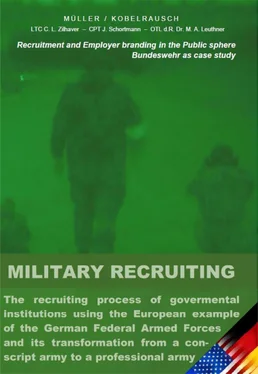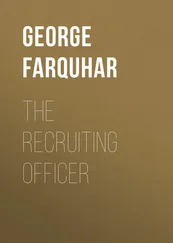The focus of this work is, however, clearly on the employer attractiveness of an institution or a company and the company’s benefit resulting from a conceptually well-defined employer branding. The Employer brand is based on an employer-employee interaction and a targeted market expansion in terms of "human resources" and it is able to generate a sustainable competitiveness and performance for the employer.
Thus the whole work conducted is intended to help both "civilian employers" as interdependent basic research, in particular governmental and semi-governmental institutions in the field of scientific research on the "public employer State” with analytical approach and notably develops courses of action for the topic "MILITARY RECRUITING".
Acknowledgement
At this point I would like to thank especially CPT Justin Schortmann (266th Financial management Support Center Kaiserslautern, Germany), LTC Cody L. Zilhaver (US Army Central Command) and Klaudia Kobelrausch that with their contribution and ongoing support the publication of English-language version of the study became possible.
For taking care of the work, I thank my Professor PD Dr. Dieter K. Tscheulin ((Department of Marketing and Health Management, Business Management Seminar II of the University of Freiburg) and my supervisor PD Dr. Florian Drevs, who could inspire the emergence of the study by their commitment, and willingness to discuss and their ongoing and constructive criticism. I would also like to thank the Land Command Hessen (Bundeswehr), and his manager Mr. Brigadier General Eckart Klink, for active support by the field work at Hessentag. Likewise, my thanks go to the reservists’ association Kreisgruppe Kurhessen und Landesgruppe Hessen for the provision of the infrastructure.
Without volunteers, supporters and interview partners no survey can be carried out, thus I would like to say big thank you to everyone involved in the study.
As always, in the "hot final phase" proofreaders are a highly appreciated help. In this present case my associates have not only read, but also made constructive and critical questions, contributing to a further increase in quality of the work. I thank Dr. Michael-A. Leuthner, CPA, CIA, Lieutenant Colonel d.R., Mrs. Ann-Katrin Brede, Mrs. Lydia Olbrich and Mr. Felix Moritz for their assistance.
Additionally, my special thanks go to my employer, especially my group leader Mr. Jörg Dünte and my department head Mr. Wolf-Dieter Tesch, who made - in addition to their permanent support - the occupational constitution of the study possible during time as a working student for Helaba.
Finally, my special thanks go to Markus Thomalla (Master of Business Administration, Recruiter, Hauptmann d.R), Catherine Haverkamp (Diploma in Business Law, athena advice OHG), Jörg Haverkamp, Jörg Zähringer (Office Head of member of German Bundestag Peter Weiß) and all those who were involved, making a publication from the original work. In particular, I thank Attorney Michael Leckebusch, lawyer and lieutenant of the reserve, for his final "legal view" over the complete work.
Markus Müller, 1LT (reserve officer), graduate economist and banker
1. Introduction
"Our security is not just protected at in Germany, but also defended in the Hindu Kush [when there are threats to our country like an internationally organized terrorist formation] 1! This sentence from incumbent Federal Minister of Defense Dr. Struck (2004) in its commonly used form "Germany is defended at the Hindu Kush“ 2shaped the image of the Bundeswehr like no other phrase in the past decade. From the time of the „cold war“ 3until about 1989/90, the role of the German Armed Forces was quite clearly defined. The defense of Germany was the explicit mission of the Bundeswehr and thus, in the NATO alliance, troops were first stationed at the Inner-German border that divided Europe between East and West and marked the sectors of influence of the two world powers, USA and USSR, for decades within Europe. However, with the removal of the threat of war between the East and the West, not only the geographical map of Germany and other European countries changed, but also the role and therefore the raison d'être of the Bundeswehr. As Volker Ruhe in the context of the eastward expansion of NATO so well stated, Germany was „surrounded by friends“ 4with the completed enlargement of the EU on 1 May 2004.
By now, even the original role of pure defense for the German Armed Forces was outdated and the new role of the German Armed Forces placed more emphasis on military participation in the NATO alliance and contributing to the alliance’s international conflict management abilities as Dr. Struck (2004) pointed out in reference to the Afghanistan deployment of the Bundeswehr.
Nevertheless, it is clear that a country has usually both national and supranational interests. For Germany, these are perhaps not as clearly defined, discussed and pronounced as in other countries, but they are existent. Weißbuch 2006 5in his paper on German Security Policy and the situation of the Bundeswehr (Merkel and Jung, 2006) reaches back to his last publication in 1994 and discusses the major changes in the international environment of Germany and its implications for German forces. The debate on security, foreign and defense policy needs a clear analysis: what German interests are to be protected and to be promoted, what kind of challenges and threats are facing Germany, what resources can be counted on, how should Germany proceed and what is the role of the Bundeswehr in this process? This permanent change in external security conditions and corresponding implications to the role of the German Armed Forces, led to a serious transformation processes within the German Armed Forces over the last one and a half decades.
In addition to this loss of sociopolitical significance of the Bundeswehr, another profound change for the German Armed Forces took place through the suspension of compulsory military service on 1 July 2011.
So now the Bundeswehr faces the difficulties of many other professional armies in attracting and recruiting the required number of new service members. Now that the Bundeswehr is no longer tied to the society by compulsory military service, it has to work out other ways of establishing a connection with the populace.
"The Bundeswehr must be an attractive employer and its perception must undergo a transformation process in the labor market from merely a security force to a "special employer".
Based on this approach, this paper studies the attractiveness of the Bundeswehr as an employer in the light of the public good problem and the personal recruitment in the military context in conjunction with a proprietary quantitative primary data study. It concentrates on the onset of demographic change 6, the successive retirement high birth rate and vocational entry low birth rates age groups. It will be supplemented by the new challenges of the German armed forces. By eliminating general conscription, the Bundeswehr is now fully competing with civilian companies for the best minds and the right employees. This problem represents an important dilemma with long lasting effects. In addition, the Bundeswehr offers in its post- conscription era, a special research opportunity in the field of recruitment. Up until now, there are very few scientific researches to be found in the area of recruiting for armed forces and even fewer policy recommendations that have been developed which the BW as an employer in Germany could use.
At this point, in addition to an application of existing research approaches, the following study intends to establish a basic scientific methodology for recruitment of German forces, as there are already many other armies, which had to deal with this topic more intensively for a long time.
Читать дальше












